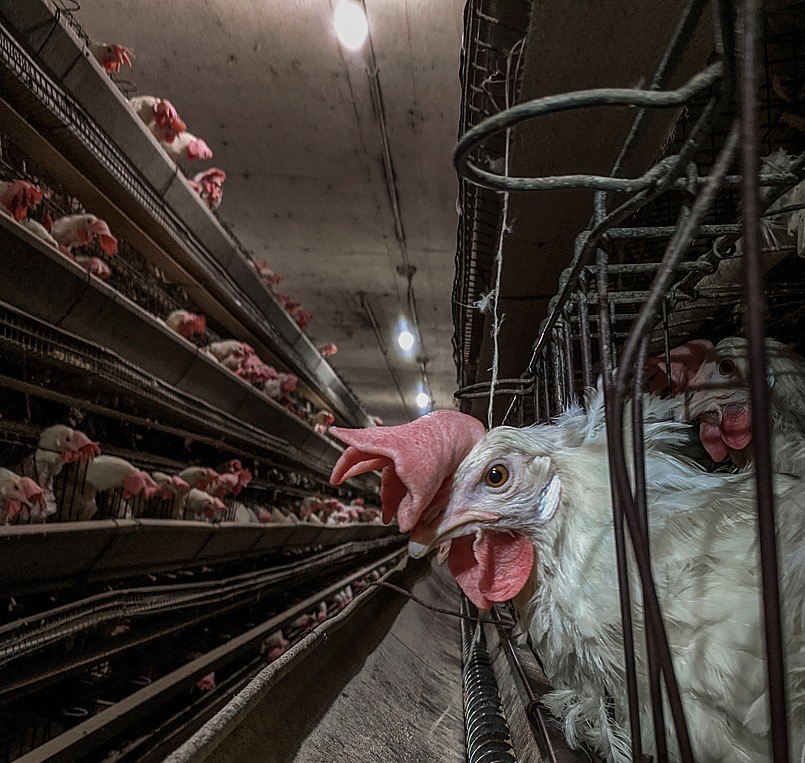There are many reasons to support a crate-free policy for Minnesota’s farmed animals. The majority of Minnesota farmed animals are raised on factory farms, also known as Confined Animal Feeding Operations (CAFOs), and are treated terribly. These farms also harm Minnesota’s residents and water quality.
Together, we can change Minnesota’s policies and/or laws to improve conditions starting this year. Below are ways to take action as an individual or as an organization.
We encourage you to sign and support this crate-free petition for the reasons outlined below. This article also shares what practices towards animals, people, and the environment won’t change as a result of the changes this petition calls for.
Treatment of Minnesota’s Farmed Animals
The animals we raise for food have family relationships and basic needs just like all other animals, including humans!
Most Minnesotans want to see changes in how these animals are treated. The petition and legislation calls for these ideas:
- Mother pigs should not be put in crates/cages that prevent them from getting up while feeding their children.
- Chickens should not be forced to live in small battery cages where they are stuffed in with other chickens and cannot spread their wings.
- Baby calves should not be forced to live in tiny veal crates that they can only exit via a short rope staked to the ground.
Changes in these practices would end a great deal of suffering for the over 90 million animals raised for food in Minnesota. We urge you to sign this petition today.
Potential for Change in Minnesota’s Treatment of Farmed Animals
Sarah Super, who created the crate-free petition, is a private citizen who has successfully lobbied to change and improve laws related to sexual assault. Sarah has formed a coalition called “Minnesotans Against Cruelty to Animals.”
Sarah and others are lobbying to get legislation introduced in 2024 that would improve conditions for farmed animals.
You can see progress updates on the petition page.
How Can Individuals and Organizations Get Involved?
Individuals
- Sign the petition.
- Send postcards in January and February inviting neighbors to sign the petition.
- Volunteer at other events to help invite more people to sign petitions.
Organizations
- Sign up to endorse a crate-free policy in Minnesota (link coming soon!)
Why Is Compassionate Action for Animals (CAA) Supporting This Petition Now?
It’s important for Compassionate Action for Animals to support this petition for a number of reasons:
- Of many policy changes that could be made for farmed animals, studies show that the greatest number of Minnesotans support a cage-free policy.
- Studies show that petitions in general are one of the most effective ways to get the public to take action for farmed animals.
- Sarah Super, the petition’s creator, has drafted cage-free legislation with support from local and national partners.
With enough public support, the changes could become law as early as this year.
What Harm to Animals, People, and the Environment Will Continue Even If These Changes Are Made?
Animals
Unfortunately, great harm is done to Minnesota’s animals on a daily basis. Some practices won’t change, even if Minnesota creates new policies like the ones the petition calls for. These practices take place even on family, organic, or “free-range” farms:
- Chickens and turkeys will be killed on production lines by being shackled upside-down while conscious and having their necks slit.
- Male baby chicks will be ground up or gassed alive, because they don’t lay eggs.
- Cows will be forcibly impregnated, and then have their babies taken away, to produce milk for human consumption.
- Animals will have their tails, testicles, and beaks cut off without anesthetic.
People and Environment
- Fast line speeds on animal killing floors not only harm animals, but they are also dangerous for the health of workers.
- The animal agriculture industry has a record of employing underage youth in Minnesota and having dairy workers die by drowning in manure.
- Continuing harm will be done to our ecosystems and atmosphere due to the larger land, water, and greenhouse gas footprints of animal agriculture compared to plant-based agriculture.
- Nitrates from the enormous amount of manure generated by Minnesota’s farmed animals are threatening Minnesota’s water supply.
- Minnesotans risk disease crossovers (like avian flus) from intensive animal operations.
We share this because we think it’s important that people understand the true consequences of animal agriculture. We urge you to sign the crate-free petition because it’s vital that change begins. Together we can tell our friends, family, and legislators that Minnesotans demand better for animals.
More Ways to Make Change
- Sign up to volunteer. We need people to distribute petitions.
- Consider joining the millions of Americans who are reducing their animal product intake. If you want to try doing so, sign up to get a recipe and shopping guide and 21 days of email support.
Taking action gives hope in the face of the horrors that animals face.

